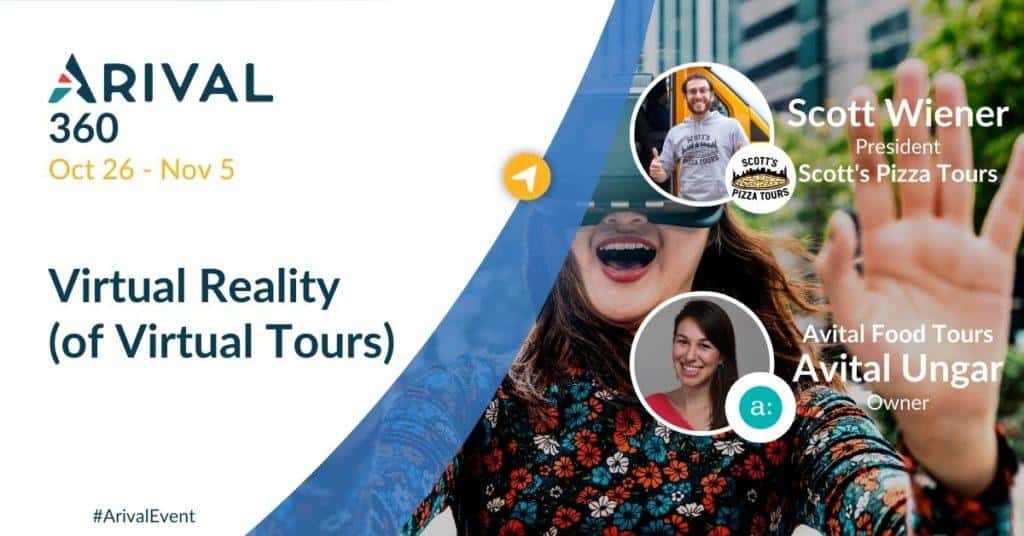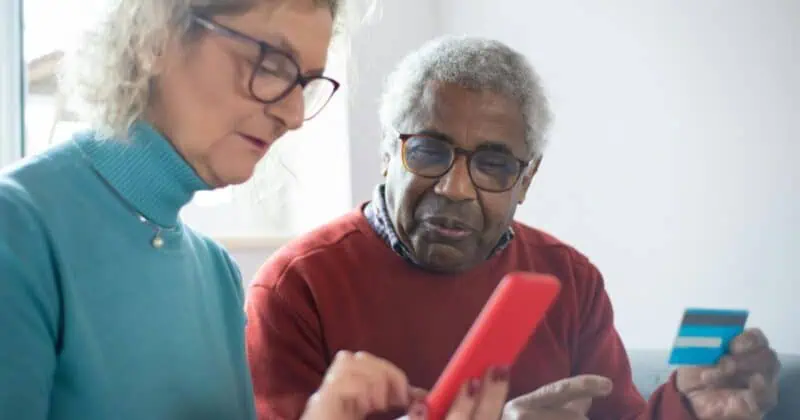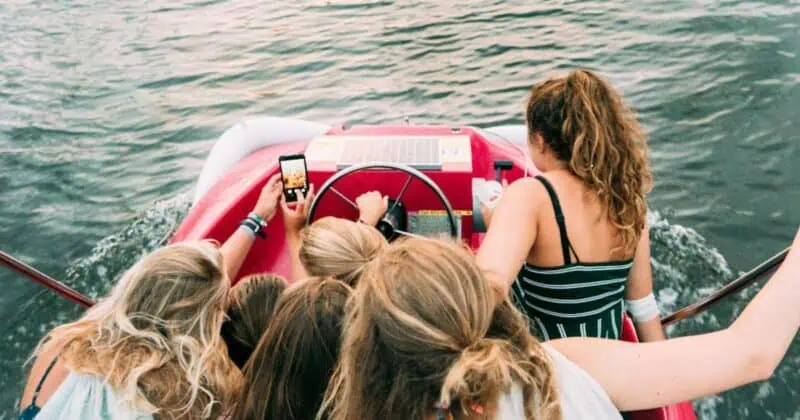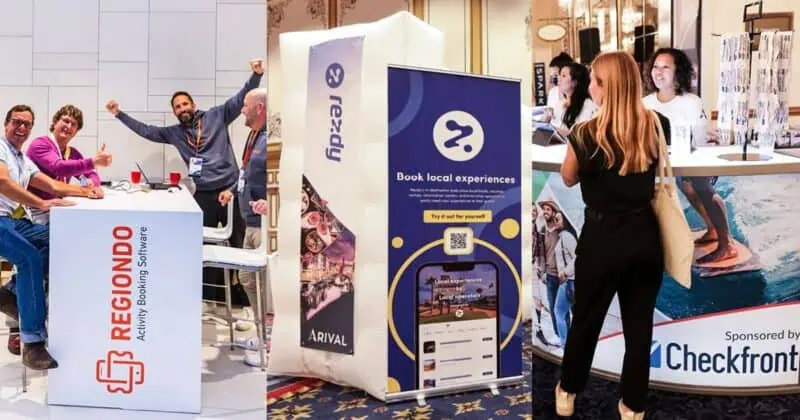Nine months into the global pandemic and travel lockdown, the question continues to make the rounds across the tour, activity, and attraction industry: are virtual experiences for real? Is there really a business there? Or are they just a pandemic-induced flash in the pan?
A quick look at Google Trends might suggest the latter. Searches for virtual tours peaked at the onset of the lockdown in the U.S. but quickly disappeared.
But many in the industry persisted. In the face of a global pandemic that brought travel to a near standstill, tour and attraction operators, experience hosts, and online travel agencies (OTAs) quickly rolled out virtual tours and experiences to connect with customers and raise much-needed cash.
Kelsey Tonner, the founder of Be A Better Guide, which provides guide training, has had more than 250 tour operators participate in their program to develop virtual experiences.
“From our program members, we’re seeing traction in virtual events for corporations and groups, online experiences with an at-home delivery element, and virtual classes where the focus is on the experience,” says Tonner.
But the debate – and doubt – among operators, online sellers and industry observers continues. Most operators have built their business on creating unique, in-person experiences whose physicality – walking, touching tasting – is integral to the experience.
Tao Tao, co-founder and COO of GetYourGuide, one of the first OTAs to launch virtual experiences, saw limits to virtual experiences. Speaking at Arival Online back in April, he pointed out that operators launching virtual tours are now competing with Netflix, which charges just $15 a month for access to the video streaming giant’s service.
More operators than not seem to share Tao’s doubts. In Arival’s Recovery Survey, which will be presented in full at Arival 360, three in four operators from a global sample of nearly 500 respondents are undecided about virtual experiences or think they are a waste of time for operators. Just one in four think they are valuable.
Enter Amazon
Now, online shopping behemoth Amazon has jumped into the mix with Amazon Explore, which offers a range of virtual experiences around the world. Many experiences are hosted by well-known tour companies such as Urban Adventures and Babylon Tours. The experiences appear to be all private, and while several are in the $20-$30 range, others are quite expensive. This 35-minute virtual tour of Prague is $210.
Amazon has had long-standing, albeit secretive plans to launch an experiences business, as we reported in the summer of 2019. It’s unclear whether Amazon Explore is a pivot from an experiences OTA to a virtual experiences business due to the pandemic, or if it was always intended to be virtual, as some have speculated. What is clear is that online shopping is embedded in many of the experiences. This has led some observers, such as Tourism Marketing Agency’s Chris Torres, to suggest that the move is really more about eCommerce than it is about travel.
Is there really a business there?
Some businesses seem to be very committed to their virtual pivots. Airbnb is all in with their Online Experiences initiative. As head of Airbnb Experiences for Asia Pacific Parin Mehta explained at the Arival Asia Pacific Virtual Summit in August, “We wouldn’t undertake it if this couldn’t be a real business.”
But he also noted that their virtual roster includes some authentic, very special hosts, including Broadway performers, star athletes, and other celebrities. Offering kids an online science field trip with Bill Nye the Science Guy or skateboarders an online experience with Tony Hawk would be out of reach for a small tour and activity operators or other platforms without the scale and resources of Airbnb.
Airbnb released a report in August about its Online Experiences initiative, claiming that hosts earned $2 million since its launch. However, the report also indicated that one host earned $350,000, implying that of the more than 700 virtual experiences, only a few may be generating significant bookings for hosts.
For others, it’s about customer engagement
Despite the hype from a few companies, results have been mixed, to say the least. Many operators have been experimenting, but it’s unclear how many have seen significant commercial results.
“It’s not a real business,” admits Scott Wiener, founder of New York’s famed Scott’s Pizza Tours, which has launched a series of virtual pizza history tours and pizza-making classes. But that doesn’t mean he isn’t all-in on virtual.
“I love it, even if I have only five people in a class,” he noted. “It keeps me really psyched. It keeps our staff engaged.”
Walks, the multi-destination experiential walking tour company, launched virtual tours in the spring starting at $10 a tour. Despite ticket sales in the tens of thousands and extensive coverage in travel media, CEO Stephen Oddo is realistic about the commercial limits of virtual experiences.
“There is clearly a desire for people to connect with places and people when they cannot go there in person, but for Walks, this is really about staying connected with our customers and providing some income for our network of guides, who have been severely impacted by the travel lockdown,” he said.
Be A Better Guide’s Tonner says for many operators it’s not just about revenue. When it comes to virtual experiences, “many operators do not list direct monetization as a primary goal,” he says of operators who join his program. “Other goals that operators shared were to stay engaged with customers, keep up brand awareness, create connections with new leads, and drive future bookings.”
A line of business, or just marketing?
Walks’ offers some of the least expensive virtual tours, and until July offered a credit toward a future purchase of an in-person tour. While this approach may not generate revenue close to the company’s business pre-Covid, it is clearly designed to get future travelers into their marketing funnel today.
Virtual experiences could become a new staple on the travel marketer’s toolkit, enabling travelers to get a taste of a place, a tour, or a guide before they commit to the full experience.
Klook, the Asia-focused OTA, has launched Klook Live!, a Livestream experience to help travelers connect with local experience providers. Although the current iteration of the service is for local experiences and shopping, given the limits on cross-border travel in Asia, it’s not hard to imagine the application of the service to broader travel experiences – especially more expensive ones – when travel resumes. Klook has reported much higher conversion rates for experience providers that leverage the Klook Live feature.
Virtual tours or virtual team building?
One avenue where some have found success is in the corporate group market and online team building. Avital Ungar, the founder of Avital Tours, pivoted into virtual experiences in March. Although they started with tours for individual consumers, she quickly saw a bigger opportunity in groups.
It was clear that “I should be focusing on a 3,000 person holiday party vs. three people on a leisure tour,” said Ungar, who also acknowledged that corporate groups were already a big part of their tour business. They already had experience and a customer set in that market. Read more about Avital Tours’ move into virtual here.
Other companies have learned a similar lesson. Walks also offer virtual events for corporate groups, as does Unexpected Atlanta. Museum Hack, the tour company specializing in museum tours, moved fast to launch TeamBuilding, running up to 19 different event types. They say their online team-building business is now larger than their original tour business.
Withlocals, the OTA for local hosts and guides based in the Netherlands, has made significant investments into online experiences, including building its own technology platform. The company has also made a similar shift to focus on the group market for its virtual experiences.
“The demand for individual leisure experiences isn’t great,” said Matthijs Keij, Withlocals’ CEO. “But for corporate meetings and team events, however, there is a really serious opportunity. We find that companies are not necessarily looking for team-building activities, but are increasingly looking to improve employee engagement and the employee experience, especially now that so many of their employees are working from home. That’s the real problem we are solving.”
Finding unexpected markets
Context Travel, another early mover into virtual, might seem like just another walking tour provider, but the company had always sought to set itself apart. Their guides, which they used to call docents, are often scholars; the tours are small groups only; the tour themes go deep on a particular topic in history and culture.
“In March our revenue went to almost zero and it was a scary time,” said CEO Evan Frank. “We became Zoom experts overnight. We tried to create an immersive cultural learning experience. And it starts and ends with our scholars and experts, who were also hurting.”
The company has received positive accolades for its virtual experiences, which it calls Context Conversations, And it has found some commercial success. Frank says the company has sold more than 15,000 tickets since launch. Tickets average at $35, although they also offer series which can run close to $300 for a multi-part online course.
While other operators have found an opportunity in the corporate market, Frank sees a bigger opportunity for Context in education, and especially in the adult education sector.
“It wasn’t just traveling that was shut down, but it was all cultural programming that was shutdown. Theater. Concerts. Museums. We see this business has the potential to be at the intersection of travel and cultural education,” said Frank, who added that the company is exploring opportunities with educational institutions.
Covid kills generic
Frank is very optimistic about the future of virtual experiences. “There’s no future scenario where I do not see this as a meaningful part of the business,” he said.
However, he’s also clear-headed about the financial realities. Despite the success of Context Conversations, he acknowledges it is still not sustaining Context Travel at the level it needs to be, yet. There are real costs to acquiring customers but especially to produce high quality, highly differentiated content. And there are limits to what you can charge online.
“One of the challenges with Covid is, it’s much harder to be generic,” observed Frank. “You really have to stand out. What truly differentiates our brand, who’s the audience for that, these are the key questions.”
“We’re all going to need to be insanely creative if we’re going to preserve our businesses during this time,” he said.
Operator takeaways
We’ve seen many great virtual initiatives from operators large and small, from virtual tours and cooking classes to online school field trips, team building, and more. Despite all of the initial enthusiasm, virtual tours are not for every operator.
Focus on experiences vs. tours. In an online format, remember your number one competitor is Netflix. You have to distinguish your virtual experience from something only you can do, and make it personal and interactive.
Know your numbers. There are real, hard costs to producing high-quality online experiences, and there are limits to what you can charge. Take a close look at the financials before you dive in.
Part of the marketing arsenal. Over the long term, virtual experiences could become a standard part of an operator’s marketing arsenal, giving travelers a chance to connect with a guide and get a feel for the experience before making the booking. Designing these experiences as lead-generation and marketing for in-person products is likely to pay off well past the pandemic.
The bottom line: If you can make a virtual experience that’s truly distinctive, if it helps keep you connected to your customers, if it helps support your guides or staff and helps market your business, consider exploring them.
Considering virtual tours and experiences? Dig deep into online with leading operators and experts at Arival 360.
Join Be A Better Guide founder Kelsey Tonner as he leads an in-depth workshop of designing virtual tours and shares his learnings of what works and what doesn’t after helping hundreds of operators create their own virtual experiences.
Join the panel discussion with Scott Wiener of Scott’s Pizza Tours and Avital Ungar of Avital Tours on Digital & Distribution Day, Monday, Nov. 2. They will share their learnings and best practices running virtual tours and classes.


















